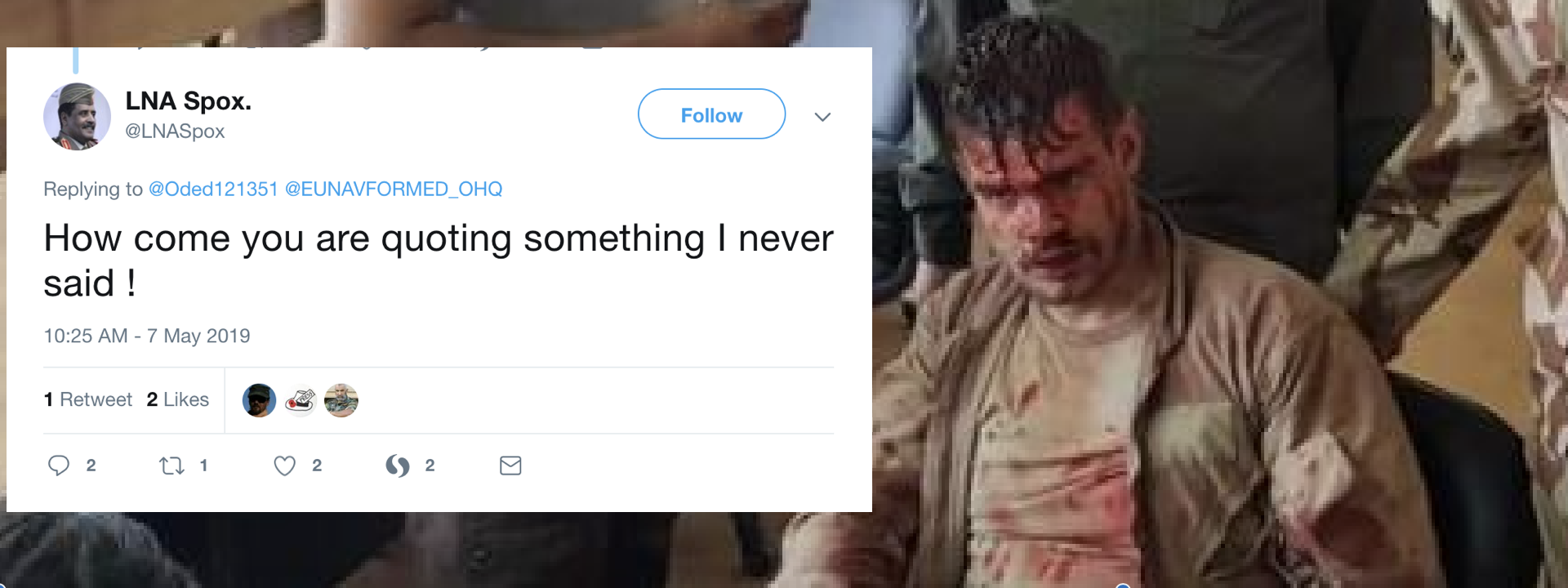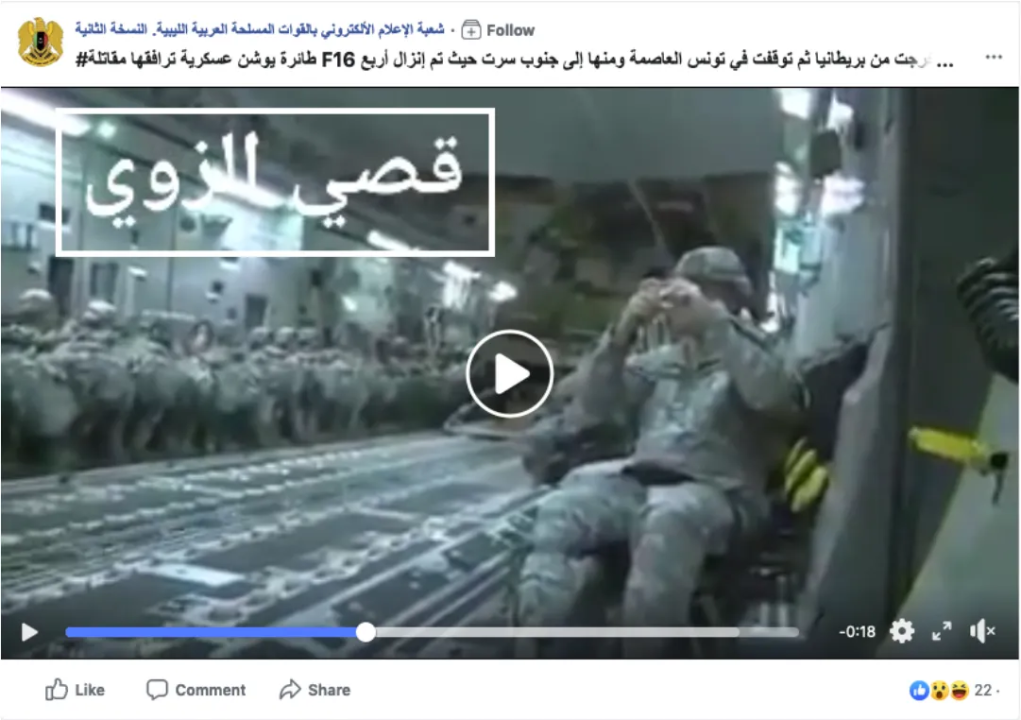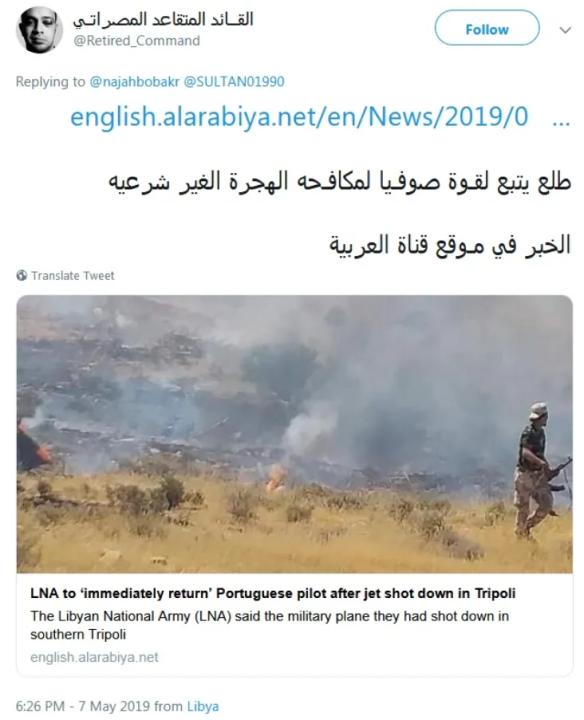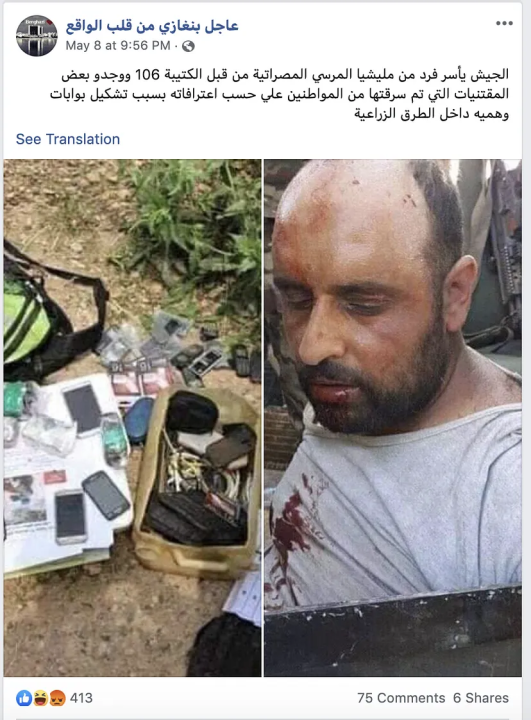Walking on Hot Coals: How Disinformation Is Fueling the Fight in Libya
As Libyan infighting in the suburbs of Tripoli entered its second month, a parallel battle raged on socialmedia
Walking on Hot Coals: How Disinformation Is Fueling the Fight in Libya

Libya’s information space is wracked by a war that parallels the battle for the capital, Tripoli, as the conflicting sides grapple for advantage in the minds of observers as well as on the ground.
The ongoing fight in the southern outskirts of the city shows both sides trying to impose their narrative across social media, coinciding with the back and forth clashes on the ground.
On April 4, 2019, Khalifa Haftar, the commander of the self-styled Libyan National Army (LNA), launched his offensive on Tripoli, home to Libya’s internationally recognized government, the Government of National Accord (GNA). Haftar claimed his operation would liberate Tripoli from terrorist groups and threatened to unleash a “volcano of wrath” against the GNA.
Since the fall of the country’s former dictator Muammar Gaddafi in 2011, this large country with only a population of 6.5 million has been wrenched apart by a dirty war of disinformation, where every militant group has its own television channels and social network pages.
Whichever side you look at, you can almost feel the blazing heat generated from the circulation of rumors, conspiracy theories, and hate speech, not to mention the sharing of footage depicting war crimes in an effort to get more likes.
Dubious Claims of British Humvees Landing in Sirte
LNA and GNA loyalists routinely repurpose Libyan civil war footage to defame one another, while simultaneously accusing the other side of doing the same.
The Libyan audience in general is often prone to embracing conspiracy theories due to decades of information deprivation, during which one narrative source dominated: the government. A government’s monopoly on information makes sorting out fact from fiction a challenge.
On May 2, a Facebook account under the name Kusai Al-Zawi posted a video on his page, claiming that an Ilyushin aircraft, accompanied by an F-16 fighter aircraft, had flown from the United Kingdom to Tunis and then continued 200 kilometers east of Tripoli, near the GNA-controlled city of Sirte. Four Humvees accompanied the F-16 for an unknown military mission. This video, however, was recycled footage from March 2011, the early stages of the Libyan revolution.
The Al-Zawi account, which is followed by around 17,000 people on Facebook and presents itself as a correspondent for the Libyan affiliate of the regional Arabic-language news network Al-Aan, later deleted the video. The account name, however, is stamped onto copies of the video circulating on pages loyal to the LNA.

The Case of the Portuguese Pilot
Impersonating others through the creation of social accounts masquerading as public figures, armed groups, and even governmental authorities is a popular and longstanding strategy around the world, including Libya, for anybody seeking to manipulate the information environment. These accounts promote fabricated stories, often presented as press reports, and use these stories to launch online attacks against other factions.

On May 7, the LNA captured a Portuguese mercenary pilot after shooting down his GNA fighter jet. While pro-LNA media circulated footage of the wounded pilot under interrogation, an inauthentic Facebook page masquerading as the popular news channel Libya Alhadath TV posted a story on the situation attributed to LNA spokesman Ahmed Al-Mesmasri. The post included an alleged quote from him linking the plane not to the GNA but, rather, to Operation Sophia, the European Union’s ongoing effort to combat migrant smuggling from Libya:
Initial information proved that the plane that was shot down by our defenses is a European surveillance plane used to monitor illegal immigration, affiliated with Operation Sophia, and not part of the fighting. We will hand over the Portuguese pilot to his country immediately after the healing of his wounds. We value the work of our European brothers in combating the illegal immigration.
After the report was published, the Saudi news network Al-Arabiya amplified the post, adding that the LNA was to “immediately return” the Portuguese pilot after his jet was shot down in Tripoli. Al-Arabiya also added that the jet was a European surveillance plane employed by Operation Sophia. The Daily Mail then cited Al-Arabiya’s report and published its own story.

Later, the real news channel Libya Alhadath TV denied publishing the fake story, flagging the original post as fake. In the meantime, however, the fake post had gone viral in Libya, with 11,000 interactions, 3,000 comments, and more than 500 shares. For a country of its size, these were huge engagement figures. In contrast, Libya Alhadath TV’s denial of the story received only 1,000 likes, 100 comments, and 70 shares, once again demonstrating that true or corrected information often has a harder time penetrating the public conscious when an alternative narrative has already gained traction.
The fake posts also angered LNA spokesman Ahmed Al-Mesmasri, who complained on Twitter, “How come you are quoting something I never said!” Hours later, he shared a screenshot of the Twitter account posing as him, saying the account was fake.
Eventually, Al-Arabiya updated the story, changing the headline to “LNA shoots down military plane in Tripoli, holding Portuguese pilot.” The Daily Mail later did the same.

Fatwas and Ramadan Breakfast
In a similar fashion, false statements from authorities and the military are often designed to imitate real ones.
On May 7, the Facebook page “Libyan Revolutionaries Operations Room,” an online community for armed groups in Tripoli, published a scanned picture of what it described as a fatwa, or religious decree, from the Higher Committee of Fatwa, a quasi-governmental advisory group aligned with Haftar and based in the eastern part of Libya. In the post, the page claimed the committee had issued a fatwa giving General Haftar’s fighters a license to eat breakfast during the month of Ramadan, when practicing Muslims typically refrain from eating after dawn.
At the time of writing, the committee’s website and Facebook page included no announcement of it having issued such a fatwa.
Fighting with Fact-Checking
Both sides of the conflict in Libya have effectively weaponized social media to further their narratives of choice. In many cases, affiliated Facebook pages include examples of fact-checking the other side’s claims, perhaps in an effort to curry public trust.
One example is the pro-GNA Facebook page, Almaliat Wadi Al-Doum 2 (“Operation Doum Valley 2”). The name is a reference to the GNA operation countering General Haftar’s attack; it was chosen to remind the eastern commander of his fate in the March 1987 Battle of Doum Valley, during the Libyan-Chadian War, when he was defeated and captured along with hundreds of Gaddafi’s soldiers. The page currently has approximately 68,000 likes, a sizeable number for a Libyan page.
Almaliat Wadi Al-Doum 2 recently conducted a fact-check of footage published on a pro-Haftar page managed from Benghazi that claimed the LNA captured a member of the Al-Marsa militia in the city of Misurata. The Al-Marsa member had allegedly stolen loot from civilians.

In response to this post, the publishers of Almaliat Wadi Al-Doum 2 noted that the photo of the man dated back to 2018 in Iraq, as can be seen in a contemporaneous tweet. “The (LNA) media has nothing but lies, pretending imaginary victories,” they wrote.
Nevertheless, pro-Haftar actors were not alone in their use of disinformation tactics to imbue their false narratives with legitimacy. The official Facebook page of Al-Marsa Brigade, which is aligned with the publishers of Almaliat Wadi Al-Doum 2 and against General Haftar, also posted recycled footage with misleading context. In one example, the page recycled an old photograph of a funeral parade, falsely claiming the funeral was for four French officers killed fighting alongside Haftar against Islamic militias. The photo, however, was taken in July 2012 by the Associated Press at a funeral ceremony at Les Invalides in Paris, France, to honor four French soldiers killed in Afghanistan.
Mohamed Kassab is a Digital Forensic Research Assistant with the Digital Forensic Research Lab (@DFRLab) based in Cairo.
Register for the DFRLab’s upcoming 360/OS summit, to be held in London on June 20–21. Join us for two days of interactive sessions and join a growing network of #DigitalSherlocks fighting for facts worldwide!

